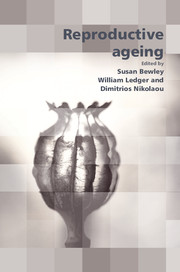Book contents
- Frontmatter
- Contents
- Participants
- Declarations of personal interest
- Preface
- SECTION 1 BACKGROUND TO AGEING AND DEMOGRAPHICS
- SECTION 2 BASIC SCIENCE OF REPRODUCTIVE AGEING
- SECTION 3 PREGNANCY: THE AGEING MOTHER AND MEDICAL NEEDS
- 13 The effect of age on obstetric (maternal and fetal) outcomes
- 14 The older mother and medical disorders of pregnancy
- 15 The ageing mother and medical needs
- SECTION 4 THE OUTCOMES: CHILDREN AND MOTHERS
- SECTION 5 FUTURE FERTILITY INSURANCE: SCREENING, CRYOPRESERVATION OR EGG DONORS?
- SECTION 6 SEX BEYOND AND AFTER FERTILITY
- SECTION 7 REPRODUCTIVE AGEING AND THE RCOG: AN INTERNATIONAL COLLEGE
- SECTION 8 FERTILITY TREATMENT: SCIENCE AND REALITY – THE NHS AND THE MARKET
- SECTION 9 THE FUTURE: DREAMS AND WAKING UP
- SECTION 10 CONSENSUS VIEWS
- Index
15 - The ageing mother and medical needs
from SECTION 3 - PREGNANCY: THE AGEING MOTHER AND MEDICAL NEEDS
Published online by Cambridge University Press: 05 February 2014
- Frontmatter
- Contents
- Participants
- Declarations of personal interest
- Preface
- SECTION 1 BACKGROUND TO AGEING AND DEMOGRAPHICS
- SECTION 2 BASIC SCIENCE OF REPRODUCTIVE AGEING
- SECTION 3 PREGNANCY: THE AGEING MOTHER AND MEDICAL NEEDS
- 13 The effect of age on obstetric (maternal and fetal) outcomes
- 14 The older mother and medical disorders of pregnancy
- 15 The ageing mother and medical needs
- SECTION 4 THE OUTCOMES: CHILDREN AND MOTHERS
- SECTION 5 FUTURE FERTILITY INSURANCE: SCREENING, CRYOPRESERVATION OR EGG DONORS?
- SECTION 6 SEX BEYOND AND AFTER FERTILITY
- SECTION 7 REPRODUCTIVE AGEING AND THE RCOG: AN INTERNATIONAL COLLEGE
- SECTION 8 FERTILITY TREATMENT: SCIENCE AND REALITY – THE NHS AND THE MARKET
- SECTION 9 THE FUTURE: DREAMS AND WAKING UP
- SECTION 10 CONSENSUS VIEWS
- Index
Summary
Dimitrios Nikolaou: Two excellent presentations. Many women think that if they optimise their health, somehow they just will ‘get away with it’ — do you agree?
Mandish Dhanjal: It is difficult to tease out the data. Maybe if you look at the egg donation pregnancies because they are obviously a healthy group of women. Hypertension and diabetes, etc., have all been excluded. Yet they have much greater risk.
Susan Bewley: Thank you very much for two excellent talks. I took away two points. One is around framing age as an individual's problem — because when we reach 30 we cannot go back to be being 20 — as opposed to a public health problem. With those very dramatic shifts in women rightwards (see Figure 13.8, page 137), if 600000—700000 women giving birth annually are on average 3 years older than their counterparts were 20—30 years ago, the whole UK childbearing population is almost 2 million reproductive years older! There is a tension between the individual woman, and not making her anxious, and the public health problem — which needs naming. I would like your comments. The second point is directed to the fertility experts here. Do you think there is an age, even with a healthy, marathon-running, vitamin-taking woman that we should say ‘Actually, it is unethical to get you pregnant because of the maternal risks’? Albeit the risk of death is small, you are making women pregnant and they might die.
Keywords
- Type
- Chapter
- Information
- Reproductive Ageing , pp. 163 - 170Publisher: Cambridge University PressPrint publication year: 2009



